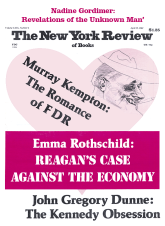In response to:
Greece Against Itself from the October 8, 1981 issue
To the Editors:
Peter Green’s review [NYR, October 8] of Ambassador MacVeagh Reports: Greece 1933-1947 gives the impression that MacVeagh was “soft on Communism” and that he played no great part in the build-up to the Truman Doctrine. It does not make clear that the diaries which form much of the basis of this book continue only until April 1945; his private letters to Franklin Roosevelt obviously end here as well. While Professor Iatrides has provided a sound but brief summary of MacVeagh’s attitudes after this time, mainly from State Department records, this cannot compare with the rich material from the diaries and letters for the earlier period. This book alone, therefore, does not give us the full flavour of MacVeagh’s work in 1946 and 1947.
The files of the British Foreign Office provide substantial evidence of MacVeagh’s strong stand against the Communist-led guerrilla uprising of 1946-1947. The British did take a long time to forgive him for his studied neutrality (based on specific orders from Washington) in December 1944; but the British Embassy in Athens reported a major change in MacVeagh’s attitudes by the summer of 1946. They attributed this in part to the action of British army doctors in saving the life of Mrs. MacVeagh. Whatever the cause, they felt that MacVeagh was now very useful to them in the face of growing leftwing rebellion. The Foreign Office records show MacVeagh in the autumn of 1946 pressing Washington for immediate and extensive aid to Greece, in rather impatient terms, which may be in keeping with the State Department’s reference to his “adventurism.”
Mr. Green is right to describe MacVeagh as an elusive figure in this drama; the book in question does provide more information, but there is still a need for further study of his role in the events which led to the Truman Doctrine.
Robert Frazier
University of Nottingham, England
Peter Green replies:
By comparison with some of the postwar political carnivals MacVeagh was undoubtedly “soft”—but not on Greek communism, which (as I made clear in my review) he understood from fairly early on in the game. Mr. Frazier’s point about his later activities is well taken.
This Issue
April 15, 1982



